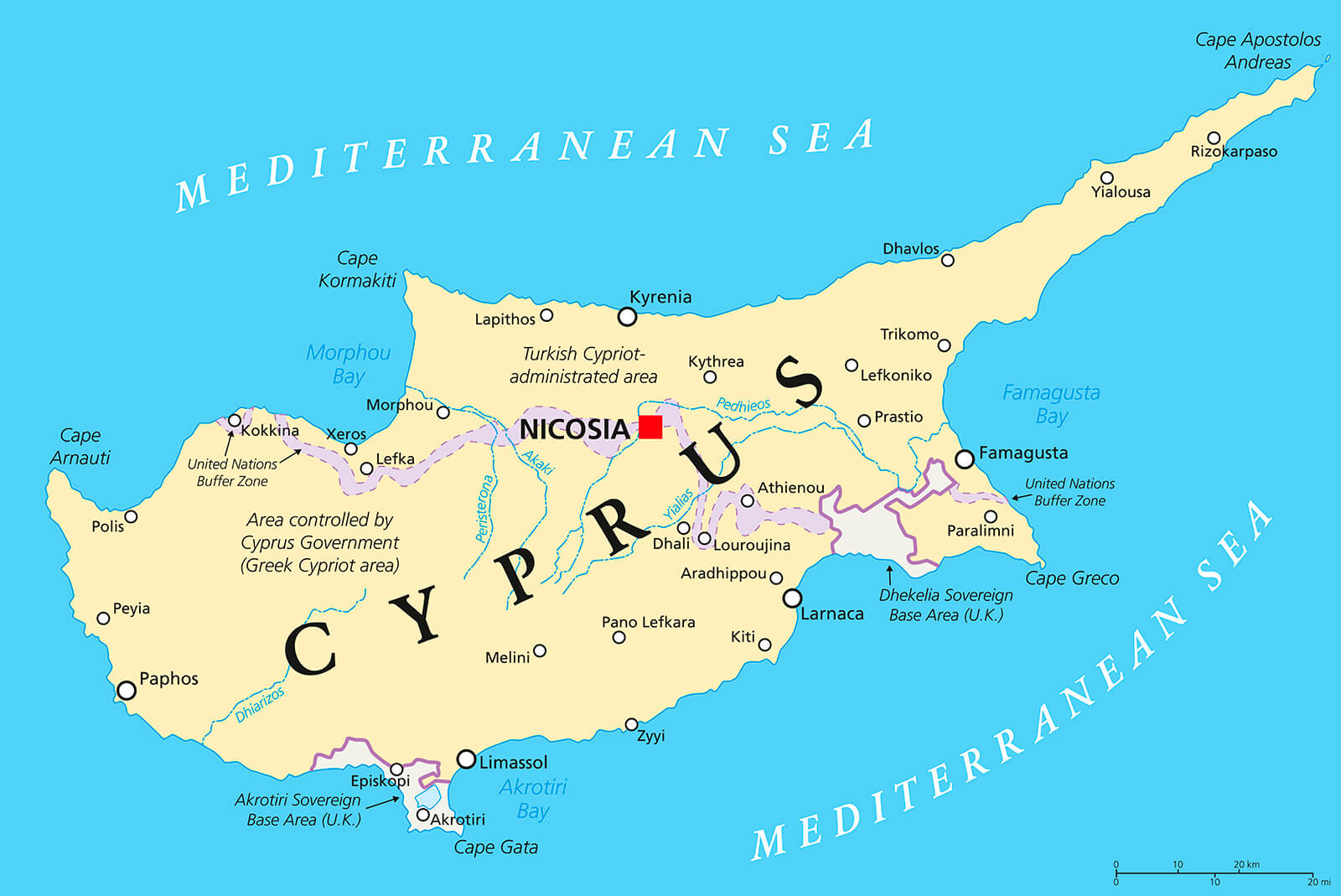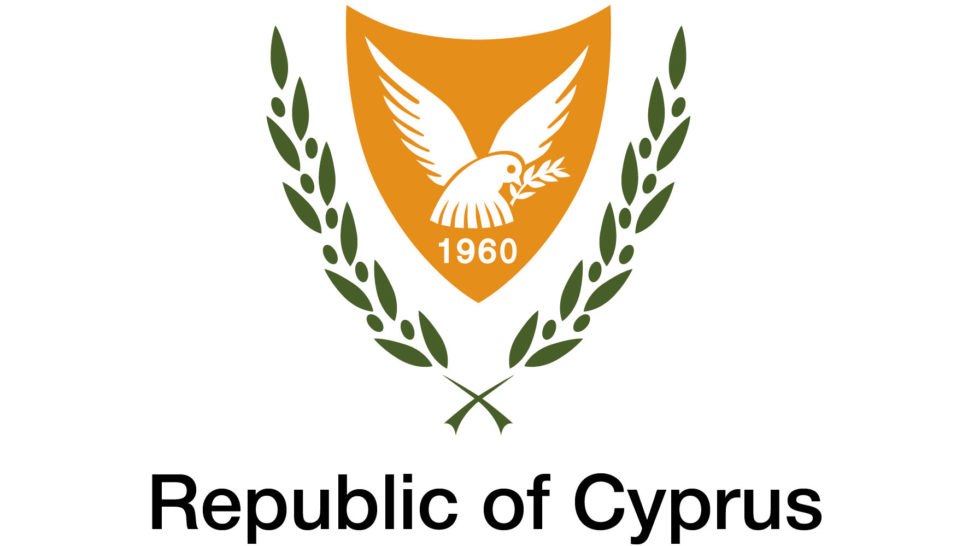at a glance
Cyprus
The Cyprus officially the Republic of Cyprus is a member state of the
European Union
Become An Associate
Cyprus is the timeless diamond of the Mediterranean

CONTACT US
Cyprus officially the Republic of Cyprus
(Greek: Κυπριακή Δημοκρατία),
is an island country situated in the eastern Mediterranean east of Greece, west of Lebanon, Syria, and Israel, south of Turkey and north of Egypt.
Cyprus is the third largest Mediterranean island and one of the most popular tourist destinations, attracting over 2.4 million tourists per year. A former British colony, it became an independent republic in 1960 and a member of the Commonwealth in 1961. The Republic of Cyprus is one of the advanced economies in the region, and has been a member of the European Union since 1 May 2004. It adopted the euro on 1 January 2008.
In 1974, following years of intercommunal violence between ethnic Greeks and Turks and an attempted coup d’état by Greek Cypriot nationalists aimed at annexing the island to Greece and engineered by the military junta then in power in Athens, Turkey invaded and occupied one third of the island.
This led to the displacement of thousands of Cypriots and the establishment of a separate Turkish Cypriot political entity in the north. This event and its resulting political situation are matters of ongoing dispute.
The Republic of Cyprus, the internationally recognized state, has de jure sovereignty over the entire island of Cyprus and its surrounding waters, with appendix O of the Treaty of Establishment of the Republic providing for 3% of its territory to be used by the United Kingdom as sovereign military bases. The island is de facto partitioned into four main parts:
• the area under the effective control of the Republic of Cyprus, in the south of the island;
• the Turkish-controlled area in the north, calling itself the Turkish Republic of Northern Cyprus (recognized only by Turkey);
• the United Nations-controlled Green Line, separating the two; and
• two British Sovereign Base Areas (Akrotiri and Dhekelia).
Economy
The Cypriot economy is prosperous and has diversified in recent years. According to the latest IMF estimates, its per capita GDP (adjusted for purchasing power) is, at $46,865, the third highest in the European Union, after that of Luxembourg and Malta.
Cyprus has been sought as a base for several offshore businesses for its highly developed infrastructure. Economic policy of the Cyprus government has focused on meeting the criteria for admission to the European Union. Adoption of the euro as a national currency is required of all new countries joining the European Union, and the Cypriot government adopted the currency on 1 January 2008.
Cyprus is a member state of the European Union and the Eurozone.
Oil has recently been discovered in the seabed between Cyprus and Egypt, and talks are underway between Lebanon and Egypt to reach an agreement regarding the exploration of these resources. The seabed separating Lebanon and Cyprus is believed to hold significant quantities of crude oil and natural gas.
The economy of the Turkish-occupied area is dominated by the services sector, including the public sector, trade, tourism and education, with smaller agriculture and light manufacturing sectors. The economy operates on a free-market basis, although it continues to be handicapped by the political isolation of Turkish Cypriots, the lack of private and governmental investment, high freight costs, and shortages of skilled labor. Despite these constraints, the economy turned in an impressive performance in 2003 and 2004, with growth rates of 9.6% and 11.4%. The average income in the area is $5,000 per capita, and the Turkish government has pledged to increase this to $12,000 through investment and aid. Growth has been buoyed by the relative stability of the Turkish new lira and by a boom in the education and construction sectors.
![cyprus-economy-forecast_285868395-768x432[1] Cyprus economy](https://alfazeda.com/wp-content/uploads/2021/03/cyprus-economy-forecast_285868395-768x4321-1.jpeg)

Cyprus Income Taxes and Tax Laws
- The tax system in Cyprus is progressive. In other words, the higher your income, the higher the rate at which you will pay tax. In 2008 the tax rates for an individual are 20% – 30%.
- There is a reduced rate and / or exemptions that are granted for certain forms of income.
- The standard rate of Cyprus corporate tax for 2008 is 10%.
- The profits of off shore companies that were registered in Cyprus before 12/2001 were charged a final tax of 4.25%.This tax rate ended on 31.12.2005, From 1.1.2006 international business companies, IBC, are taxed at 10% rate.
- Residents are subject to defense contribution for passive income, e.g. rental, dividends etc. the rates are 3%-15%.
- Non residents are exempt from this tax.




Income Tax for an Individual
- An individual is liable for tax on his income as an employee and on income as a self-employed person.
- Tax will be payable on income earned in Cyprus and overseas but excepting a salary received overseas by an individual who meets the test of a “permanent resident” of Cyprus.
- A foreign resident who is employed in Cyprus pays tax only on income earned in Cyprus.
- To be considered a resident of Cyprus, residence of at least 183 days in Cyprus during any calendar tax year must be established or a life that is centered in Cyprus.
- An employer is obligated to deduct, immediately, each month, the amount of tax and national insurance due from a salaried worker.
- A self-employed individual is obligated to make advance payments on income tax that will be offset on filing an annual report. The advance payments are made in three equal payments.
- Certain payments are deductible from taxable income as detailed below.
Cyprus Individual income tax rates 2008
|
Tax % |
Tax Base (EUR) |
|
0 |
Up to 19,500 |
|
20% |
19,501-28,000 |
|
25% |
28,001-36,300 |
|
30% |
36,301 and over |
The following forms of income are exempt from income tax:
- An individual’s income up to EUR 19,500 per resident.
- Dividend and interest income. For companies, 50% of interest income from ordinary activities.
- An individual who receives a pension in Cyprus from overseas employment, to a limit.
- Part of capital gains that are received by an individual on the sale of real estate – see under the heading “Capital Gains” for fuller details.
- For companies, gain from sale of securities.
- Profit from permanent establishment abroad.
- Compensation for death and injury.
Cyprus Tax Relief
- All forms of tax relief in Cyprus relate to the income of an individual.
- The following amounts are subject to the definitions in law.
| Individual Relief | Amount – CYP |
| Donations | With document the whole amount. |
| Life Insurance | Up to 1/6 of the taxable income. |
| Child Grant. | A grant of EUR 2,563 per year for a child taking high education. |
| Professional membership dues | The entire amount is allowable |
| Income from rent | 20% of the income is tax exempt. |
| Blind Person Grant | EUR 3,417 per year. |
Cyprus Individual income tax rates 2008
Corporate Tax
- The basic tax rate is 12.5 %.
- The tax rate for semi-government bodies is 25%.
- Shipping companies sailing under Cyprus flag pay zero tax on profits and dividend paid.
In addition to the deductions/credits listed above, deductions and business expenses may be claimed as specified below:
- Offset of losses – A loss may be offset forward with no limit.
- Transactions between associated parties – These are transactions with companies with ownership ties or a significant identity of control. Where transactions with associated parties are concerned, the transactions are meticulously checked by the Tax Authorities, and prices compared to the accepted market prices.
Depreciation of Fixed Assets
- The depreciated balance method or the straight line method are the usual methods of depreciation in Cyprus.
- The following is a Depreciation Table (Straight Line):
|
Class of Asset |
Annual Depreciation (%) |
|
Commercial buildings |
3 |
|
Industrial buildings |
4 (Some hotels are eligible for an |
|
Vehicles |
20 |
|
Computers |
20 |
|
Office Equipment |
10 |
|
Machinery and Equipment |
10 |
Value Added Tax
- In most cases, VAT is 19%.
- There are reduced rates of VAT of 5% and 8% that refer mainly to food and agricultural products.books, newspapers, rural transportation etc.
- VAT is charged on assets and services in Cyprus as well as on imports into Cyprus.
- Exports are not subject to VAT.
- There is a liability for VAT when the annual turnover is in excess of EUR 15,377.
Inheritance and Gifts Tax
- There is no tax on gifts.
- Inherritance tax, estate duty, was abolished in Cyprus.
Immovable Property Tax
- The tax is imposed on the real estate market value.
- The tax rates are 2.5%-4%.
- Property having a value of less than EUR 170,860 is tax exempt.
- The tax is paid each year on 30 September.
Cyprus Tax Benefits
- Dividends paid by a Cypriot company to a company overseas are exempt from deduction of tax at source.
- Activity in the free trade zone of Larnaca is exempt from customs duties.
- 20% of salaries of non-residents are tax exempt for the first 3 years, up to an annual exemption of CYP 5,000.
- Ships registered under a Cypriot flag have zero tax on profits and dividends received from a ship owning company.
- Capital gain from sale of a Cypriot ship, or sale of shares in a ship owning company are tax exempt.
Double Taxation Prevention Treaties
Cyprus is a signatory to a Treaty for the Prevention of Double Taxation with many countries all over the world.
Draft agreements with additional countries are at the discussion stages.
A Double Taxation Prevention Treaty, in principle, enables offsetting tax paid in one of 2 countries against the tax payable in the other, in this way preventing double taxation.
Another important factor is the grant of an exemption or tax at a reduced rate on certain receipts such as interest, royalties, dividends, capital gains and others that are connected with a transaction carried out between parties associated with the Double Taxation Prevention Treaty.
The information contained in this Site has been written in general terms and therefore cannot be relied on to cover specific situations; application of the principles set out will depend upon the particular circumstances involved and we recommend that you obtain professional advice before acting or refraining from acting on any of the contents of this newsletter. AlfaZeda Associates Limited would be pleased to advise readers on how to apply the principles set out in this newsletter to their specific circumstances. AlfaZeda Associates Limited accepts no duty of care or liability for any loss occasioned to any person acting or refraining from action as a result of any material in this newsletter.

Cyprus
25 March, Number 19,
3d floor, office 301,
zip code 2408, Engomi,
Nicosia – Cyprus
Telephone: (00357) 22 496471
Email: admin@alfazeda.eu
Greece
85 Vouliagmenis Avenue
City Plaza Mall
1st Floor – Office 312
16674 Glyfada
Athens , Greece
Telephone: (0030) 211 8007080
Email: admin@alfazeda.eu
greece@alfazeda.eu
United Kingdom
12 Gateway Mews
Ring Way
London
N11 2UT
Telephone: (0044) 20 8368 8456
T/Fax: (0044) 20 8361 4239
Email: info@gga.biz

Cyprus
25 March, Number 19,
3d floor, office 301,
zip code 2408, Engomi,
Nicosia – Cyprus
Telephone: (00357) 22 496471
Email: admin@alfazeda.eu
—————————–
Greece
85 Vouliagmenis Avenue
City Plaza Mall
1st Floor – Office 312
16674 Glyfada
Athens , Greece
Telephone: (0030) 211 8007080
Email: admin@alfazeda.eu
greece@alfazeda.eu
—————————–
United Kingdom
12 Gateway Mews
Ring Way
London
N11 2UT
Telephone: (0044) 20 8368 8456
T/Fax: (0044) 20 8361 4239
Email: info@gga.biz


